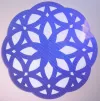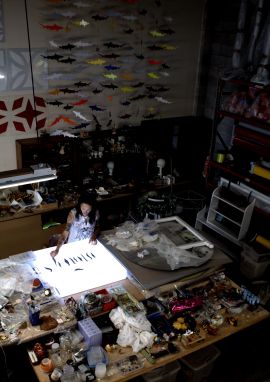Niki Hastings-McFall
"Drawing on the traditions of Pacific adornment, Hastings-McFall has created her own unique art practice that explores what it means to be a New Zealander of Pacific Island descent living in the twenty-first century."
Helen Kedgley
Niki Hastings-McFall was born and raised in Titirangi, West Auckland, she was educated at Auckland Girl's Grammar, Auckland University and Manukau School of Visual Arts and has a Bachelor of Visual Arts and a tertiary teaching diploma.
Niki Hastings-McFall has exhibited extensively throughout New Zealand and overseas since 1992 and her work is held in public and private collections nationally and internationally, including the Chartwell Trust, British Museum, GOMA, Museum of Volkekund-Germany, Tjibaou Centre- Noumea, Museum of New Zealand Te Papa Tongarewa, The University of Auckland, Victoria University, Pacific Notion, Macy Gallery New York & Sydney College Arts 2001- Whitespace (formerly Pacific Artspace); Melbourne Artfair 2000- Whitespace (formerly Pacific Artspace); and many others.
"Niki Hastings-McFall - like her surname, her art reflects a juxtapositioning and hyphenation of her Palagi and Samoan heritages, a binary that in practice is intimately entwined and interrelated.Her art practice, which developed from the early 1990s, addressed and continues to explore a number of key issues relevant to the discourse of a then-emerging contemporary Pacific art practice in Aotearoa/New Zealand. She now takes her place as a key figure in the contemporary Pacific art scene both locally and internationally. Her work has been exhibited in defining exhibitions including Bottled Ocean, Latitudes (France), Paradise Now? (USA) and Pasifika Styles (UK). These exhibitions have helped to create a wider framework in the conceptualising of contemporary Pacific creative expression, clearly locating Aotearoa/New Zealand within the Pacific as well as in an international context. Much of Hastings-McFall's work has been discussed in terms of cultural identity, an exploration of her identity, simultaneously reflecting on and referring to Pacific cross-cultural histories and colonial legacies. Her art practice is much broader though, for the dynamics of identity resonate in more complex multi-faceted ways."
Dr Caroline Vercoe 'Danse catalogue'

















